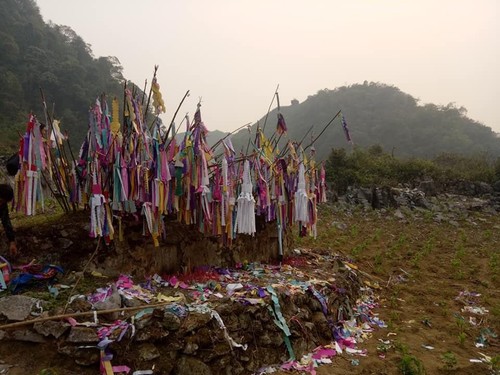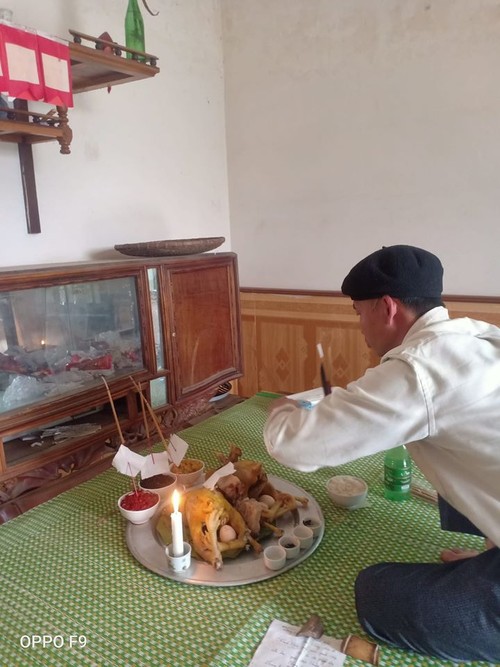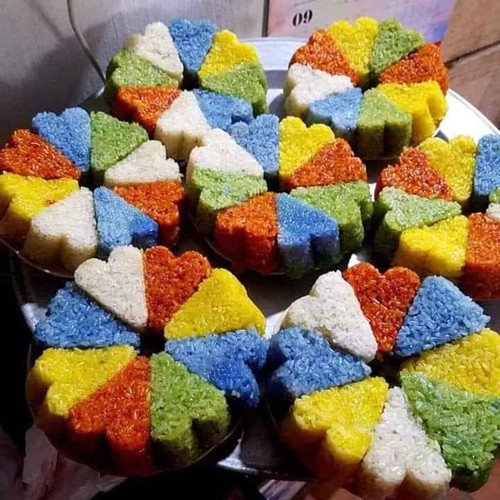 The more children one has, the more flags are hung on his grave. The more children one has, the more flags are hung on his grave. |
To prepare for the grave visiting day, all family members of Dao Quan Chet gather at the ancestors’ house. They choose a good day first, then invite two shamans to inform their ancestors about the grave-visiting day.
Each family prepares offerings including liquor, pigs, chicken and banh day (round glutinous rice cakes) to worship their ancestors. Votive money papers are indispensable on the ancestors’ altar. There are two kinds of votive money papers: the white ones are for the dead to use in the afterlife, and the yellow ones represent precious jewelry like gold.
As a ritual to pay tribute to the dead, the villagers also clean up and worship unmarked graves during the festival.
Dao Quan Chet offer the dead shrimp and fish and they think that the smaller the shrimps and fish are, the better.
Mr. Trinh Tien Xuan, a Dao ethnic in Yen Lap district, Phu Tho province, said, “Grave visiting festival is an opportunity for us to pay tribute to the dead. The offering of shrimps and fish shows the diversity of the nature. Shrimps and fish from fresh water are cleaned and cooked in different ways like frying, boiling or grilling and offered to the ancestors. The offering is then distributed and eaten by the worshipers.”
 Dao ethnic people worship at grave-visiting festival. Dao ethnic people worship at grave-visiting festival. |
The Dao Khâu ethnic group in Sin Ho district, Lai Chau province, prepare carefully for grave visiting festival right on the early days of the third lunar month.
Men are in charge of votive papers. They cut colorful votive papers into small flags which will be tied on the trees. Meanwhile, women brew liquor and make sticky rice and rice cakes.
Before the grave visiting day, Dao people clean up the graves, set up small trees and hang colorful paper flags. Then, they place offerings on the graves and pray for a year of happiness and good luck.
After visiting graves, Dao people go back to their houses without visiting any other house. Cheo Lieu Pao from Sin Ho district, Lai Chau province, said, “The Dao Khau have the grave visiting festival in the third lunar month. This is a chance for a family gathering and to pay tribute to the ancestors. I think the tradition of visiting graves is a good one and should be kept for subsequent generations.”
 Five-colored sticky rice is made for grave visiting festival Five-colored sticky rice is made for grave visiting festival |
But the Dao Tiền ethnic group in Nguyen Binh district, Cao Bang province, does not visit graves on this occasion. According to a legend, when someone’s father died, he or she could not come back in time on the funeral day. Since then, the Dao Tien always wear a white headscarf to remember their father instead of visiting his grave.
Dr. Ban Tuan Nang from Ho Chi Minh National Academy of Politics, said Dao Tien people only worship their ancestors at home.
“To pay tribute to the dead, Dao Tien people do not visit graves but just worship their ancestors at home. They offer red and black sticky rice and day cakes and send their prayers to the ancestors. This is also the best time to begin a new crop”.